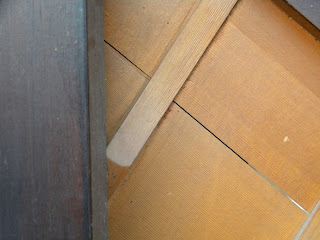This
was a rather melancholy moment for me.
The
piano was old – manufactured around 1905, according to the man who
did some work on it a couple of years ago – and I love old things.
And
this particular old piano held a lot of memories for me. It belonged
to my parents before it belonged to me.
When
I was very young, after all the kids were in bed, my mom would sit
down at the piano and play. I loved falling asleep to the sound of
her music.
I
taught my first piano lessons to my younger brother on that piano.
That was his one and only year of piano lessons, but I have taken
credit for all his subsequent musical prowess on account of that one year.
I
practiced many years worth of piano on that piano. I remember
thinking one time in high school that it was during some of these
practices that I was following Jesus' imperative to “not let your
left hand know what your right hand is doing .” (Mt 6:3)
These
last two memories may have happened in the same year.
But
the piano was old and had suffered many difficulties in its' latter
years. A period of cold and disuse. A period (in between my
parent's ownership and ours) of misuse where it lost a number of its
ivories. A couple years of high humidity, a couple years of brittle
dryness. These are hard on a piano, particularly this old piano.
Its sound board had two major cracks and it wouldn't hold its tune
any more, making any piano practicing painful to listen to – even
when all the right notes were played.
So we
hauled it out to make room for a different one. One that has all its
ivories and an uncracked sound board.
But
first we had to get it out of our neighbors' basement.
They
said it hadn't be hard to get it down.
Only
this time we were going in a different direction. Up is a little
more challenging. And these seemed like particularly steep stairs.
Stairs are always particularly steep when a piano is involved.
We
enlisted the help of the musical brother (in payment for all those
amazing lessons 20 years ago!) and the help of the neighbour whose
wife had sold us the piano. And of course, my husband who knows how
to do things. Like hauling a piano out of a basement.
I, on
the other hand, only know how to worry about how to do things. How
were we going to get this thing out of the basement and up the stairs
without someone ending up squashed beneath a piano? Were these ropes
going to hold? Was the piano going to tip and put a hole in our
neighbours' wall? Was anyone going to end up with a hernia or
excruciating back pain? Oh dear, oh dear!
Long
story short, the piano is currently in my living room, ready to be
played. No one died or was injured. We left the house in good
repair.
My
husband was exhausted. He said his back was fine; it just took a
lot of energy to be the “Yes, we can” guy. Probably especially
when your wife is flitting about worrying and expecting anyone to die
at any moment.
You'd
think that I would know a thing or two about how helpful worry is by
now. My brother, in relating another piano-moving story, likened the
worrying owner to an irritating fly that you can't swat away because
your hands are full. What would I have done if the piano had ended
up on top of someone? Said “I told you so?” “I knew this
would happen?” Something equally helpful? Is hand-wringing and "voicing my concerns" really the best way to show that I care?
I
don't generally think of myself as a worrier – so long as
everything goes according to my plan. The obvious solution to my
worrying, then, is that everybody and everything just cooperate and
participate in my good plan. It's only when I come up against some
resistance to this solution, or when I don't have a plan for the
situation in front of me, that I begin to worry. Which is as helpful
to the situation as an irritating fly.
In Luke12:25, Jesus asks his disciples: “Who of you
by worrying can add a single hour to your life? [or, I might add, to
the life of anyone else, including a piano mover?] Since you cannot do this very little
thing, why do you worry about the rest?”
I am guaranteed obstacles in life, things or people or
events I can't control. A quote I read this morning may have some
insight for this predicament. Theologian Richard Rohr says, “Faith
is not for overcoming obstacles; it is for experiencing them.”





No comments:
Post a Comment